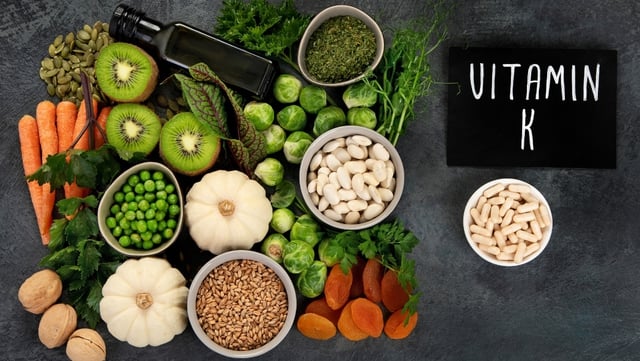Question : Doctor, many people only know Vitamin K for its role in blood clotting. Could you please explain more clearly what Vitamin K is and why there is a distinction between K1 and K2? (Hoang Hai N - Quang Tri )
Dr. Tran Khanh Van (Head of Micronutrients Department, National Institute of Nutrition) : Vitamin K is the general name of a group of fat-soluble substances that share the same structure 2-methyl 1,4-naphthoquinone. We are often interested in two main forms in nature:
- Vitamin K1 (Phylloquinone): This is the most common form in the diet, derived mainly from plants, especially dark green leafy vegetables.
- Vitamin K2 (Menaquinone): This is a group of vitamin K, numbered MK-4 through MK-13. Vitamin K2 is found in some fermented foods (like Japanese natto) and animal products. Our bodies can also partially convert K1 to K2.
In addition, there is Vitamin K3 (Menadione) which is a synthetic form, not found in nature.
Question: So what is the current level of Vitamin K deficiency, especially in Vietnam, doctor? ( Bich Van - Hanoi )
Dr. Tran Khanh Van : Vitamin K deficiency in healthy adults is relatively rare, because we can easily supplement K1 from green vegetables. However, this condition still occurs in people with severe liver disease, biliary obstruction, or fat malabsorption syndrome.
The most worrying group is the newborn. Vitamin K is poorly transported across the placenta, resulting in low concentrations in the umbilical cord blood at birth. Without prophylactic vitamin K, the newborn is at high risk of Vitamin K Deficiency Bleeding (VKDB), a serious public health problem.
To see the severity, if not prevented, the incidence of late VKDB (per 100,000 births) in the UK is 4.4 cases, in Germany is 7.2 cases, and in Thailand is 72 cases. Alarmingly, a study in Hanoi (1995-1999) showed that the rate of late VKDB (causing intracranial bleeding) in Vietnam is up to 116/100,000 live births, especially high in rural areas. Even in the US, a study showed that 97% of the elderly are vitamin K deficient.

A study in the US has shown that 97% of the elderly are deficient in vitamin K.
Question: Can you elaborate on the "heroic" role of Vitamin K in bone health? Many people think that Calcium and Vitamin D are enough. ( Thu Hoai - Hanoi)
Dr. Tran Khanh Van : This is a common misconception. Calcium and Vitamin D are necessary, but Vitamin K (especially K2) is sufficient to get calcium to where the body needs it. Vitamin K's role is to "activate" the proteins that depend on it. For bones, there are two key proteins:
- Osteocalcin: This is a protein synthesized by bone-forming cells, accounting for 15-20% of the protein in bones. When in an inactive form, Osteocalcin cannot do anything. Vitamin K2 will activate Osteocalcin, turning it into a form that can "capture" calcium ions in the blood and "attach" them to the right position on the skeleton, helping to increase bone density and mass.
- Matrix Gla Protein (MGP): This protein is also activated by Vitamin K2. But MGP acts as a "guardian", preventing calcium from being deposited in soft tissues, cartilage and especially blood vessel walls. Many meta-analyses have confirmed that K1 and K2 supplementation reduces bone loss, K2 reduces fractures. A prominent clinical study (Knapen M et al. 2013) on 244 postmenopausal women showed that supplementing 180µg K2 MK-7 daily for 3 years helped maintain bone mineral density effectively compared to the placebo group.

Vitamin K is one of the most important but often overlooked micronutrients in the diet.
Question: Besides bones, what are the newly discovered health benefits of Vitamin K? (Vu Duc Binh - Hai Phong )
Dr. Tran Khanh Van : Thanks to the ability to activate MGP, the biggest benefit that is being concerned about is cardiovascular health. MGP prevents calcium from depositing in the vessel walls, which is the process of coronary artery calcification (or atherosclerosis), the main cause of myocardial infarction and stroke.
Additionally, Vitamin K2 has also been shown to benefit neurological health. A 2021 study (Badmaev et al.) found that supplementing with 200µg of MK-7 daily for 8 weeks significantly reduced peripheral neuropathy symptoms (such as numbness, tingling, and cramps) in both type 2 diabetics and B12 deficient individuals.
Question: What is the current recommended requirement for Vitamin K, doctor? (Bui Giang - Bac Ninh)
Dr. Tran Khanh Van : This is an interesting point, because the recommended levels vary greatly between countries and most countries have only developed recommendations for Vitamin K1.
For example, NASEM (USA) recommends 120µg/day (men) and 90µg/day (women). WHO (2004) recommends 65µg (men) and 55µg (women). In Vietnam (2016), the Recommended Intake (AI) for adults is 50µg/day (for both men and women). Notably, Japan is the country with the highest recommended intake in the world of 150µg/day for adults.
New evidence of the unique functions of K2 is becoming increasingly clear. A diverse intake of both K1 (from green vegetables) and K2 (from fermented foods or supplements) is essential for overall health protection.
 The trend of excess energy and lack of micronutrients – New challenges in modern nutrition
The trend of excess energy and lack of micronutrients – New challenges in modern nutritionSource: https://suckhoedoisong.vn/hoi-dap-ve-vitamin-k-loi-ich-moi-cho-xuong-va-tim-mach-169251029215952063.htm



![[Photo] Ho Chi Minh City Youth Take Action for a Cleaner Environment](https://vphoto.vietnam.vn/thumb/1200x675/vietnam/resource/IMAGE/2025/11/04/1762233574890_550816358-1108586934787014-6430522970717297480-n-1-jpg.webp)
![[Photo] The road connecting Dong Nai with Ho Chi Minh City is still unfinished after 5 years of construction.](https://vphoto.vietnam.vn/thumb/1200x675/vietnam/resource/IMAGE/2025/11/04/1762241675985_ndo_br_dji-20251104104418-0635-d-resize-1295-jpg.webp)
![[Photo] Panorama of the Patriotic Emulation Congress of Nhan Dan Newspaper for the period 2025-2030](https://vphoto.vietnam.vn/thumb/1200x675/vietnam/resource/IMAGE/2025/11/04/1762252775462_ndo_br_dhthiduayeuncbaond-6125-jpg.webp)
![[Photo] Ca Mau "struggling" to cope with the highest tide of the year, forecast to exceed alert level 3](https://vphoto.vietnam.vn/thumb/1200x675/vietnam/resource/IMAGE/2025/11/04/1762235371445_ndo_br_trieu-cuong-2-6486-jpg.webp)



































































































Comment (0)